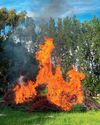Versuchen GOLD - Frei
State of origin
New Zealand Listener
|July 30 - August 5, 2022
Archaeology continues to turn up fossil evidence that humans may not have evolved only on Africa's savannahs.

Scientists have long supposed that early humans evolved on African savannahs. But that idea has become questionable.
The traditional theory suggests our chimp-like ancestors used their long arms and short legs to climb and swing through the African jungles. On the ground, they walked on all fours and on their knuckles. Between 200,000 and 300,000 years ago, the African climate dried out and many forested parts turned into open grassland, especially in east Africa.
As forests disappeared and apemen moved on to the savannahs, they underwent a suite of skeletal changes. They adapted to their new home by evolving longer legs and walking upright. Bipedalism allowed the earliest humans to see over the tall grass in search of prey or predators. Longer legs enabled them to walk or run long distances and develop "adroit movements, swiftness and stealth" (to quote an early theorist). It freed up apemen's arms and hands. They evolved longer opposable thumbs and shorter, straighter fingers - all the better for throwing objects, clubbing prey (or each other) and for handling objects with dexterity.
About 200,000 years ago, their brains started to grow dramatically, and some 100,000 to 50,000 years ago, Homo sapiens developed the power of complex speech.
Diese Geschichte stammt aus der July 30 - August 5, 2022-Ausgabe von New Zealand Listener.
Abonnieren Sie Magzter GOLD, um auf Tausende kuratierter Premium-Geschichten und über 9.000 Zeitschriften und Zeitungen zuzugreifen.
Sie sind bereits Abonnent? Anmelden
WEITERE GESCHICHTEN VON New Zealand Listener

New Zealand Listener
Down to earth diva
One of the great singers of our time, Joyce DiDonato is set to make her New Zealand debut with Berlioz.
8 mins
29 November-December 5 2025

New Zealand Listener
Tamahori in his own words
Opening credits
5 mins
29 November-December 5 2025

New Zealand Listener
Thought bubbles
Why do chewing gum and doodling help us concentrate?
3 mins
29 November-December 5 2025

New Zealand Listener
The Don
Sir Donald McIntyre, 1934-2025
2 mins
29 November-December 5 2025

New Zealand Listener
I'm a firestarter
Late spring is bonfire season out here in the sticks. It is the time of year when we rural types - even we half-baked, lily-livered ones who have washed up from the city - set fire to enormous piles of dead wood, felled trees and sundry vegetation that have been building up since last summer, or perhaps even the summer before.
2 mins
29 November-December 5 2025

New Zealand Listener
Salary sticks
Most discussions around pay equity involve raising women's wages to the equivalent of men's. But there is an alternative.
3 mins
29 November-December 5 2025

New Zealand Listener
THE NOSE KNOWS
A New Zealand innovation is clearing the air for hayfever sufferers and revolutionising the $30 billion global nasal decongestant market.
2 mins
29 November-December 5 2025

New Zealand Listener
View from the hilltop
A classy Hawke's Bay syrah hits all the right notes to command a high price.
2 mins
29 November-December 5 2025

New Zealand Listener
Speak easy
Much is still unknown about the causes of stuttering but researchers are making progress on its genetic origins.
3 mins
29 November-December 5 2025

New Zealand Listener
Recycling the family silver?
As election year looms, National is looking for ways to pay for its inevitable promises.
4 mins
29 November-December 5 2025
Translate
Change font size

